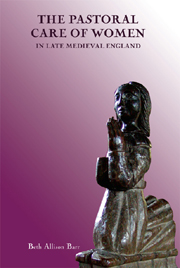Book contents
- Frontmatter
- Contents
- Miscellaneous Frontmatter
- Acknowledgments
- List of Abbreviations
- Introduction: “Be it husband, be it wife”
- 1 Pastoral Vernacular Literature
- 2 Pastoral Language
- 3 Pastoral Perceptions
- 4 Pastoral Care
- Conclusion: Gendered Lessons
- Appendix I The Manuscripts of Mirk's Festial
- Appendix II The Exampla of Mirk's Festial
- Bibliography
- Index
2 - Pastoral Language
“Christ’s People, Both Men and Women”
Published online by Cambridge University Press: 12 September 2012
- Frontmatter
- Contents
- Miscellaneous Frontmatter
- Acknowledgments
- List of Abbreviations
- Introduction: “Be it husband, be it wife”
- 1 Pastoral Vernacular Literature
- 2 Pastoral Language
- 3 Pastoral Perceptions
- 4 Pastoral Care
- Conclusion: Gendered Lessons
- Appendix I The Manuscripts of Mirk's Festial
- Appendix II The Exampla of Mirk's Festial
- Bibliography
- Index
Summary
JOHN MIRK concluded his Festial sermon on the Lord's Prayer with an exemplum about a woman who had lived in sexual immorality for many years. One day when she was in church, she listened to a sermon about the “horrible pains of hell ordained” for those who lived in lechery and “would not leave it.” The words of this sermon so convicted her that “she was contrite and stirred by the Holy Ghost, that she went, and shrove her, and took her penance, and was in full purpose forto have left her sin for always after.” Yet on her way home she met her lover who seduced her with calming words. “If all things were such that is preached, there should no man nor woman be saved; and therefore leave it not, for it is not such. But be we hereafter of one assent, as we have been before, and I will plight you my troth that I will never leave, but hold you always.” Then “turned the woman her heart, and did the sin as they did before.” Shortly thereafter they both suddenly died. A concerned priest prayed that God would show him the state of their souls, and as he walked past a body of water one day, he saw a dark mist hovering above the surface and heard the voices of this man and woman emanating from the darkness.
- Type
- Chapter
- Information
- The Pastoral Care of Women in Late Medieval England , pp. 36 - 61Publisher: Boydell & BrewerPrint publication year: 2008

